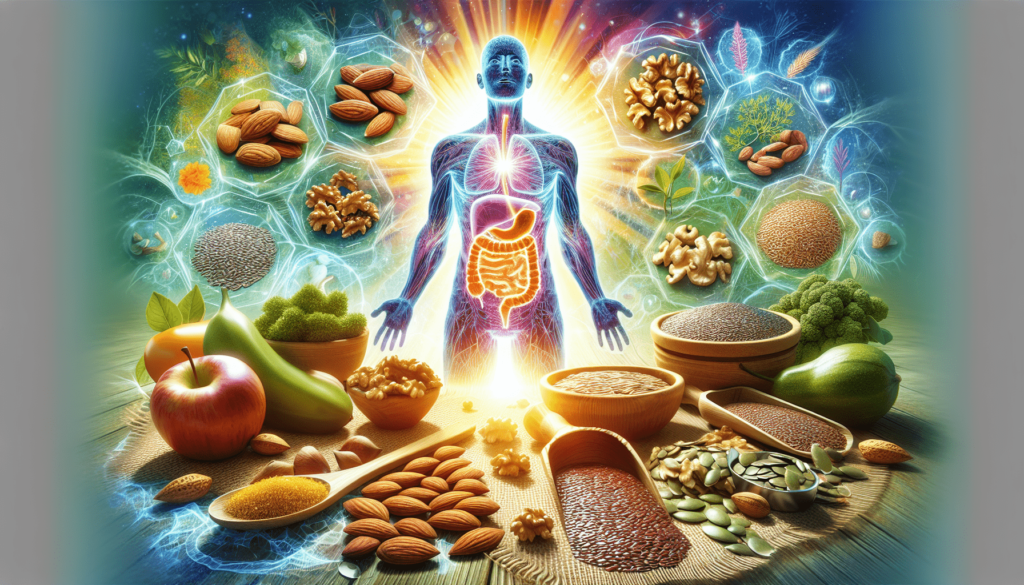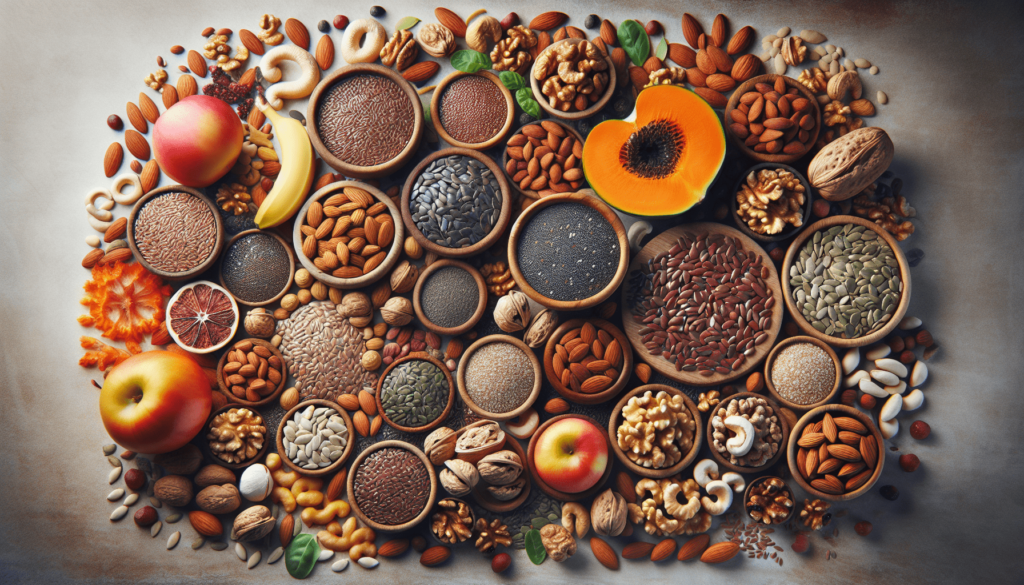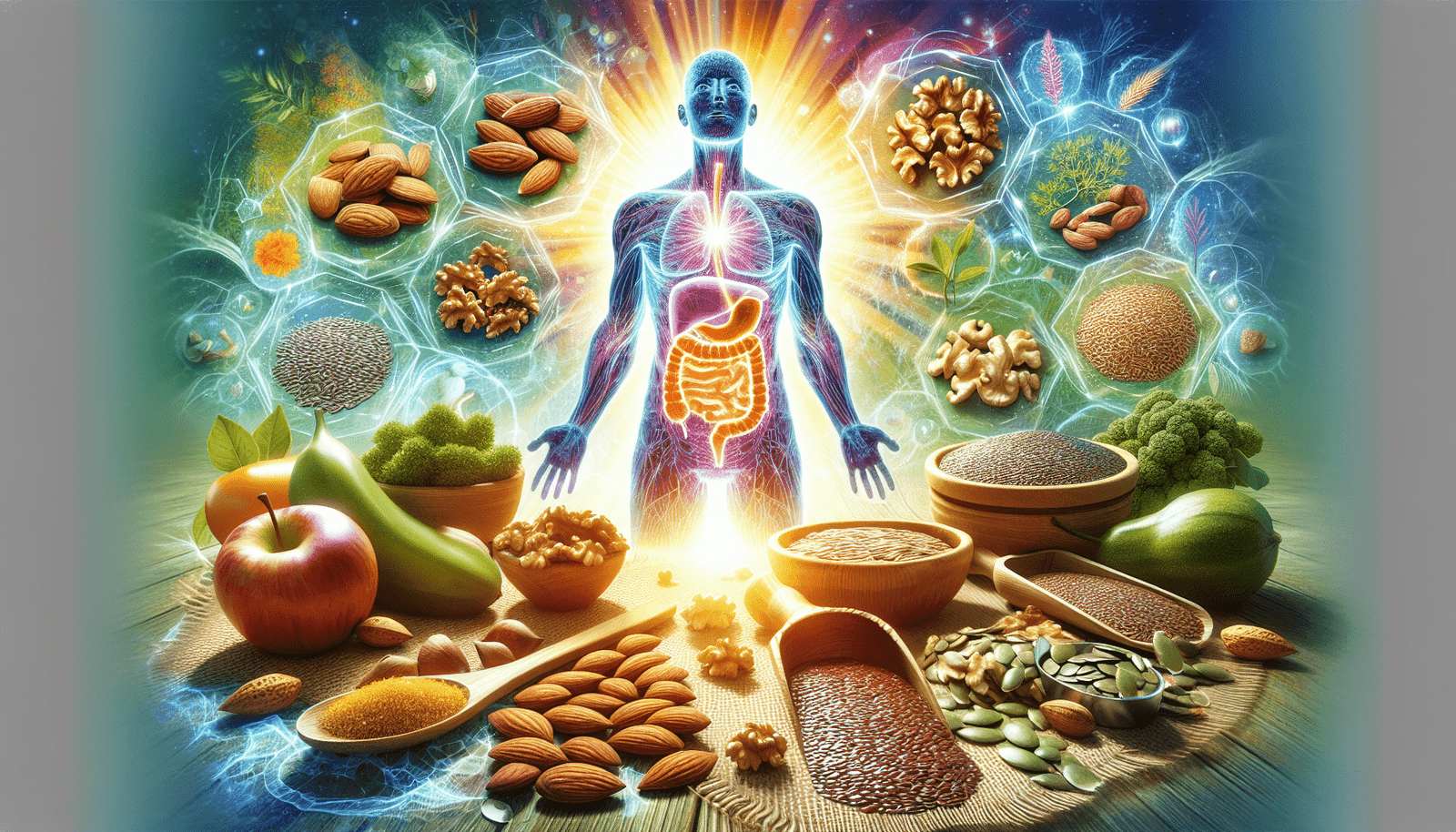Incorporating nuts and seeds into your gut-friendly diet can have numerous evidence-based benefits. These tiny powerhouses are packed with essential nutrients, healthy fats, fiber, and antioxidants that contribute to overall gut health. From promoting a diverse microbiome to reducing inflammation, the consumption of nuts and seeds has been linked to improved digestive health and enhanced overall wellbeing. So, grab a handful of these nutritious snacks and give your gut the love it deserves!
Improved Gut Health
Increased fiber intake
Including nuts and seeds in your diet can significantly increase your fiber intake, which is essential for maintaining good gut health. Fiber acts as a prebiotic, providing food for the beneficial bacteria in your gut, known as gut microbiota. These bacteria help break down food, absorb nutrients, and contribute to a healthy digestive system. By consuming more fiber from nuts and seeds, you support the growth and diversity of these beneficial bacteria, promoting overall gut health.
Promotion of healthy gut microbiota
The gut microbiota plays a crucial role in maintaining a healthy gut. Including nuts and seeds in your diet can help promote the growth of beneficial bacteria, such as Bifidobacterium and Lactobacillus, which contribute to a balanced gut microbiota. These bacteria aid in digestion, produce essential vitamins, and support a strong immune system. By incorporating nuts and seeds into your meals, you provide a nourishing environment for these beneficial bacteria, leading to improved gut health.
Reduction in inflammation
Inflammation in the gut can cause various digestive disorders and contribute to the development of chronic diseases. Fortunately, nuts and seeds offer anti-inflammatory properties that can help reduce inflammation in the gut. They contain compounds like polyphenols, flavonoids, and omega-3 fatty acids, which have been shown to decrease inflammatory markers and promote a healthier gut environment. By including nuts and seeds in your diet, you can support the reduction of inflammation and maintain good gut health.
Weight Management
Increased satiety
When it comes to managing your weight, feeling satisfied after meals is crucial. Nuts and seeds can contribute to increased satiety due to their high protein and fiber content. Protein helps you feel fuller for longer, while fiber adds bulk to your meals, reducing hunger cravings. By including nuts and seeds in your diet, you can stay satisfied between meals and potentially consume fewer calories overall, supporting your weight management goals.
Reduced calorie absorption
Certain nuts and seeds, such as almonds and chia seeds, have been found to inhibit the absorption of calories during digestion. The combination of their high fiber content and unique composition forms a gel-like barrier in the intestines, slowing down the absorption of fats and sugars. This can help lower overall calorie intake and contribute to weight management efforts. By incorporating these nuts and seeds into your diet, you can enhance your weight management journey.
Improved metabolic function
Maintaining a healthy metabolism is essential for weight management. Nuts and seeds are rich in nutrients that support proper metabolic function, such as magnesium and vitamin E. Magnesium plays a crucial role in energy production and glucose metabolism, while vitamin E acts as an antioxidant, protecting cells from oxidative stress. Including nuts and seeds in your diet ensures an adequate intake of these nutrients, supporting a healthy metabolism and overall weight management.

Reduced Risk of Heart Disease
Lower LDL cholesterol levels
High levels of LDL cholesterol, also known as “bad” cholesterol, are a significant risk factor for heart disease. Fortunately, nuts and seeds have been shown to have a positive impact on cholesterol levels. They contain heart-healthy fats, such as monounsaturated and polyunsaturated fats, which can help lower LDL cholesterol levels. Additionally, nuts and seeds provide plant sterols, which compete with cholesterol absorption in the intestines, further promoting healthier cholesterol levels. By incorporating these foods into your diet, you can contribute to reducing the risk of heart disease.
Decreased blood pressure
Maintaining healthy blood pressure levels is essential for cardiovascular health. Nuts and seeds can play a role in reducing blood pressure due to their high content of minerals like potassium and magnesium. Potassium helps relax blood vessels, reducing the strain on the cardiovascular system, while magnesium supports proper blood vessel function. By including nuts and seeds in your diet, you can help support healthy blood pressure levels and reduce the risk of heart disease.
Improved lipid profile
Nuts and seeds provide a healthy source of fats and can positively influence lipid profile markers. Studies have shown that regular consumption of nuts and seeds can increase HDL cholesterol, also known as “good” cholesterol, which is beneficial for heart health. Additionally, these foods have been associated with a decrease in triglyceride levels, another key marker of cardiovascular health. By incorporating nuts and seeds into your diet, you can improve your lipid profile and reduce the risk of heart disease.
Lower Risk of Type 2 Diabetes
Improved insulin sensitivity
Insulin sensitivity is crucial for maintaining stable blood sugar levels and preventing type 2 diabetes. Nuts and seeds have been shown to improve insulin sensitivity, which allows your body to use insulin more effectively and regulate blood sugar levels. They contain beneficial nutrients like magnesium, which plays a role in insulin signaling and glucose metabolism. By including nuts and seeds in your diet, you can support your body’s insulin sensitivity and lower the risk of developing type 2 diabetes.
Lower glycemic response
The glycemic response refers to how quickly and significantly food raises blood sugar levels. Foods with a lower glycemic response are preferable in preventing and managing type 2 diabetes. Nuts and seeds have a low glycemic index, which means they have a minimal impact on blood sugar levels. The combination of their fiber, healthy fats, and protein content slows down the release of glucose into the bloodstream, preventing blood sugar spikes. By incorporating these foods into your diet, you can help maintain stable blood sugar levels and reduce the risk of type 2 diabetes.
Enhanced glucose metabolism
Proper glucose metabolism is essential for preventing and managing type 2 diabetes. Nuts and seeds contain nutrients like magnesium and polyphenols, which have been shown to support healthy glucose metabolism. Magnesium plays a role in insulin secretion and glucose uptake by cells, while polyphenols reduce inflammation and oxidative stress, contributing to improved metabolic function. By including nuts and seeds in your diet, you can enhance your body’s glucose metabolism and reduce the risk of type 2 diabetes.

Cancer Prevention
Rich in antioxidants
Antioxidants play a crucial role in protecting cells from damage and reducing the risk of cancer. Nuts and seeds are rich sources of antioxidants, including vitamin E, selenium, and various phytochemicals. These compounds help neutralize harmful free radicals in the body, which can otherwise lead to DNA damage and the development of cancer. By including a variety of nuts and seeds in your diet, you provide your body with a diverse range of antioxidants, supporting its natural defense against cancer.
Anti-inflammatory properties
Inflammation is a driving force behind many chronic diseases, including cancer. Nuts and seeds offer anti-inflammatory properties due to their content of omega-3 fatty acids, polyphenols, and other bioactive compounds. These components help reduce inflammation in the body, protecting cells from damage and potentially inhibiting the growth of cancer cells. By incorporating nuts and seeds into your diet, you can support a lower level of inflammation and reduce the risk of certain cancers.
Protection against certain cancers
The consumption of nuts and seeds has been associated with a reduced risk of certain types of cancer. For example, research suggests that regular nut consumption may lower the risk of colorectal, pancreatic, and endometrial cancers. Likewise, seed consumption, such as flaxseeds and chia seeds, has shown potential protective effects against breast and prostate cancers. While more studies are needed to fully understand the mechanisms involved, including these foods in your diet may contribute to cancer prevention.
Improved Brain Health
Rich in omega-3 fatty acids
Omega-3 fatty acids are essential for brain health, as they contribute to the structure and function of brain cells. Nuts and seeds, particularly walnuts, flaxseeds, and chia seeds, are excellent sources of plant-based omega-3 fatty acids. These fats support brain development, enhance cognitive function, and may even have a positive impact on mood. By incorporating these nuts and seeds into your diet, you can nourish your brain and support its optimal functioning.
Enhanced cognition and memory
Cognitive decline and memory loss are common concerns as we age. However, including nuts and seeds in your diet may help maintain and improve cognitive function. The combination of nutrients found in these foods, such as vitamin E, antioxidants, and omega-3 fatty acids, has been linked to enhanced cognitive abilities and a reduced risk of neurodegenerative diseases like Alzheimer’s. By making nuts and seeds a regular part of your diet, you can promote better brain health and potentially reduce the risk of cognitive decline.
Reduced risk of neurodegenerative diseases
Neurodegenerative diseases, such as Alzheimer’s and Parkinson’s, are characterized by the progressive loss of brain cells and impaired function. Nuts and seeds contain compounds that have been shown to protect against these diseases. For instance, the antioxidants and polyphenols found in these foods help reduce oxidative stress and inflammation, both of which contribute to neurodegeneration. By incorporating nuts and seeds into your diet, you can potentially lower the risk of developing neurodegenerative diseases and support long-term brain health.
Balanced Hormones
Phytoestrogens and hormonal regulation
Certain nuts and seeds, such as flaxseeds and sesame seeds, contain compounds called phytoestrogens, which exert hormonal effects in the body. Phytoestrogens can mimic or modulate the activity of estrogen, a hormone involved in regulating various bodily processes. By consuming foods rich in phytoestrogens, you can support hormonal balance and potentially alleviate symptoms associated with hormonal imbalances.
Reduced symptoms of menopause
Menopause is a natural phase of a woman’s life, but it often comes with uncomfortable symptoms like hot flashes, night sweats, and mood swings. Including nuts and seeds in your diet, particularly those containing phytoestrogens, may help alleviate these symptoms. The estrogen-like effects of phytoestrogens can help regulate hormonal fluctuations and reduce the intensity of menopausal symptoms. By incorporating these foods into your diet, you can support a smoother transition through menopause.
Enhanced fertility
Maintaining hormonal balance is crucial for fertility and reproductive health. Nuts and seeds provide essential nutrients, such as zinc, selenium, and healthy fats, which are important for hormonal regulation and reproductive function. Moreover, their antioxidant properties can protect reproductive cells from damage and support optimal fertility. By including nuts and seeds in your diet, you can promote balanced hormones and potentially enhance fertility.
Stronger Bones
High calcium content
Calcium is essential for maintaining strong and healthy bones. Nuts and seeds, such as almonds and sesame seeds, are excellent sources of calcium that can contribute to bone health. Including these foods in your diet ensures an adequate calcium intake, supporting bone mineral density and reducing the risk of osteoporosis.
Rich in magnesium and phosphorus
In addition to calcium, nuts and seeds provide other minerals important for bone health, such as magnesium and phosphorus. Magnesium plays a crucial role in bone formation and density, while phosphorus supports the structural integrity of bones. By incorporating a variety of nuts and seeds into your diet, you can enhance your intake of these minerals and contribute to stronger bones.
Reduced risk of osteoporosis
Osteoporosis is a condition characterized by weak and brittle bones, often resulting from reduced bone density. By consuming nuts and seeds regularly, you can help reduce the risk of osteoporosis. Their abundance of bone-supporting nutrients, including calcium, magnesium, and phosphorus, strengthens bone structure and promotes overall bone health. Including these foods in your diet is an effective strategy for maintaining strong and healthy bones throughout life.
Enhanced Skin Health
Anti-aging effects
Nuts and seeds contain beneficial compounds that can have anti-aging effects on the skin. The antioxidants found in these foods help protect against oxidative stress and damage from free radicals, which are major contributors to premature aging. Additionally, the healthy fats in nuts and seeds promote skin elasticity, reducing the appearance of wrinkles and fine lines. By incorporating these foods into your diet, you can nourish your skin from within and maintain a youthful appearance.
Increased collagen production
Collagen is a protein that provides structural support to the skin, keeping it firm and supple. Nuts and seeds contain nutrients like vitamin C and amino acids, which are essential for collagen synthesis. By including these foods in your diet, you can support collagen production and promote healthier, more youthful-looking skin.
Protection against sun damage
Excessive sun exposure can lead to skin damage and increase the risk of skin cancer. However, consuming nuts and seeds can provide a natural defense against UV-induced damage. Many nuts and seeds are rich in antioxidants, such as vitamin E, that help protect the skin from harmful UV rays. By incorporating these foods into your diet, you can provide your skin with an extra layer of protection against sun damage.
Improved Nutrient Absorption
Enhanced absorption of essential nutrients
Optimal nutrient absorption is vital for overall health and wellbeing. Nuts and seeds contain nutrients like healthy fats and vitamin E, which can enhance the absorption of essential fat-soluble vitamins, such as vitamins A, D, E, and K. By including these foods in your diet, you can ensure that your body efficiently absorbs and utilizes the important nutrients it needs to function properly.
Improved digestion
Good digestion is essential for nutrient absorption and overall gut health. Nuts and seeds provide a good source of dietary fiber, which promotes healthy digestion. Fiber adds bulk to your stool, preventing constipation and maintaining regularity. Additionally, the fiber found in these foods acts as a prebiotic, nourishing the beneficial bacteria in your gut and supporting a balanced digestive system. By incorporating nuts and seeds into your diet, you can improve your digestion and enhance nutrient absorption.
Optimal nutrient utilization
In addition to enhancing nutrient absorption, nuts and seeds support optimal nutrient utilization in the body. They contain essential vitamins, minerals, and antioxidants that work synergistically to maximize the benefits of the nutrients you consume. By including a variety of nuts and seeds in your diet, you can ensure that your body receives the necessary nutrients and utilizes them efficiently for optimal health and wellbeing.
In conclusion, incorporating nuts and seeds into your diet offers numerous evidence-based benefits for your overall health. From improved gut health to enhanced brain function, these nutrient-dense foods provide a wide range of essential nutrients and bioactive compounds that support various bodily systems. Whether you’re aiming for better digestive health, weight management, or reduced risk of chronic diseases like heart disease and cancer, nuts and seeds can play a valuable role in your diet. So, why not sprinkle some almonds on your morning oatmeal or add chia seeds to your smoothies? Your body will thank you for it!

